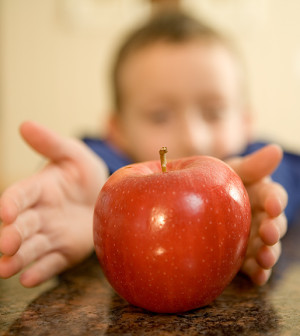- Could Your Grocery Store Meat Be Causing Recurring UTIs?
- Are You Making This Expensive Thermostat Error This Winter?
- Recognizing the Signs of Hypothyroidism
- 10 Strategies to Overcome Insomnia
- Could Artificial Sweeteners Be Aging the Brain Faster?
- Techniques for Soothing Your Nervous System
- Does the Water in Your House Smell Funny? Here’s Why
- Can a Daily Dose of Apple Cider Vinegar Actually Aid Weight Loss?
- 6 Health Beverages That Can Actually Spike Your Blood Sugar
- Treatment Options for Social Anxiety Disorder
Study Questions Use of Migraine Meds in Kids, Teens

A new study raises questions about the effectiveness of medicines commonly prescribed to prevent migraines in children and teens.
The 24-week clinical trial involving 328 patients found no significant differences between the drugs amitriptyline (Elavil), topiramate (Topamax) and a placebo sugar pill in reducing the number of days with a migraine or migraine-related disability.
Fifty-two percent of those taking amitriptyline and 55 percent of those taking topiramate saw the number of days they had a headache drop by 50 percent or more, while 61 percent of those taking a placebo pill saw the same benefit, the findings showed.
The patients taking the prescription drugs also had much higher rates of side effects, such as fatigue, dry mouth, mood changes, and tingling in the hands, arms, legs or feet.
“The study was intended to demonstrate which of the commonly used preventive medications in migraine was the most effective. What we found is that we could prevent these headaches with either a medication or a placebo,” said senior study author Dr. Andrew Hershey. He is co-director of the Headache Center at Cincinnati Children’s Hospital Medical Center.
“This study suggests that a multidisciplinary approach and the expectation of response is the most important, not necessarily the prescription provided,” he added in a hospital news release.
The researchers were “hoping to develop evidence to drive the choice by medical providers of the first-line prevention medication for helping youth with migraine, but the data showed otherwise,” said study first author Scott Powers. He is a pediatric psychologist and co-director of the Headache Center.
“We see this as an important opportunity for health care providers, scientists, children and families, because our findings suggest a paradigm shift,” Powers said.
“First-line prevention treatment will involve a multidisciplinary team approach and focus on non-pharmacological aspects of care. The good news is we can help children with migraines get better,” Powers said.
The findings were published Oct. 27 in the New England Journal of Medicine.
More information
The Migraine Research Foundation has more about migraine in children and teens.
Source: HealthDay
Copyright © 2026 HealthDay. All rights reserved.










